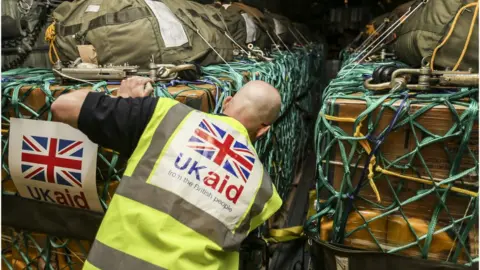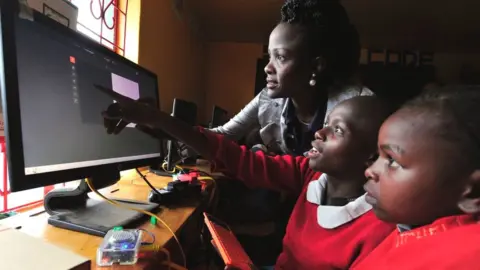Foreign aid: UK cuts funding to UN in change of strategy
 MOD
MODThe government is to give billions of pounds less in foreign aid to international organisations such as the United Nations.
Instead, the Foreign Office will spend the aid money on individual projects and countries that are UK priorities.
The change is part of a new strategy designed to ensure aid spending does more to promote foreign policy.
Aid charities criticised the strategy for focusing more on boosting UK trade than ending extreme poverty.
Foreign Secretary Liz Truss said: "In an increasingly geopolitical world, we must use development as a key part of our foreign policy."
She said the new strategy will ensure the UK's international development work has benefits across the globe and in the UK, improving economic security worldwide and increasing jobs and growth at home.
The UK currently spends about £11.5bn each year on aid - after cutting the budget by £3bn last year.
Almost 40% of the aid budget is currently given to the UN, the World Bank, European Union and other global bodies to spend on their own aid budgets.
The advantage is that these international organisations benefit from economies of scale by pooling the resources of many countries.
But under the new strategy, the Foreign Office will cut the percentage of UK aid spent on multilateral organisations down to just 25% by 2025.
The Foreign Office said the approach will mean it can "focus funding on UK priorities and control exactly how taxpayers' money is used to support these".
The UK will also offer developing countries what the Foreign Office called more "reliable investment" so they can be less dependent on the "unsustainable debt" of "malign actors".
The document does not mention China, but this is a reference to the increasing reliance of some developing countries on loans handed out by Beijing.
The Foreign Office said the aim was to bring "more countries into the orbit of free-market economies".
It added: "This will help low and middle-income countries become our trade and investment partners of the future."
Ms Truss said: "Malign actors treat economics and development as a means of control, using patronage, investment and debt as a form of economic coercion and political power.
"We won't mirror their malign tactics, but we will match them in our resolve to provide an alternative."
 Getty Images
Getty ImagesHowever, the Foreign Office was unable to say how the UK could compete with China's much bigger aid budgets.
The strategy also says a UK priority will be supporting women and girls with greater education, help with reproductive health and rights, and more protection from violence.
"We intend to restore funding for this vital work," the strategy says, a reference to the impact of last year's general aid cuts.
Humanitarian aid will also be made a priority, with the Foreign Office promising to spend £3bn over the next three years.
The Foreign Office said it also aimed to cut bureaucracy in the way it delivered development aid, in particular giving greater autonomy to UK ambassadors to make decisions on the ground.
Labour MP Sarah Champion, who chairs the House of Commons International Development Committee, said the new strategy document was "a double whammy against the global poor".
She said: "Supporting the poorest in the world should not be conditional on a trade deal or agreeing to investment partnerships.
"The UK has rightly been hugely critical of China for such an approach, so I fail to see why we are following down the same road. It is depressing and disappointing that the UK would devise a strategy like this."
'Narrow self-interest'
Liberal Democrat foreign affairs spokeswoman Layla Moran said the strategy barely mentions the "callous decision to slash aid spending" which she said was "harming the most vulnerable around the world".
"The government's misguided new focus on 'aid for trade' is yet another blow for the world's poorest," she said.
Bond, the umbrella group for aid charities, criticised the Foreign Office strategy for failing to prioritise health, climate change and open societies.
Stephanie Draper, CEO at Bond, said: "Though this strategy contains some positive elements, it seems largely driven by short-term political and economic interests rather than the attempt to tackle the root causes of global crises such as inequality, conflict and climate change, which impact us all.
"It's worrying that 'aid for trade' is at the heart of this strategy as this not only diverts money away from life-saving programmes but could see investors benefit at the expense of the marginalised communities it's supposed to serve."
Christine Allen, director at international development charity Cafod, accused the government of "raiding" the foreign aid budget to bolster the UK's trade and investment:
"Britain's role on the global stage does not mean abdicating from our responsibilities to those who are suffering - whether that's responding to the looming famines in the Horn of Africa or the impacts of the climate crisis in Bangladesh," she said.
"It is definitely not reneging on existing aid commitments for a narrow self-interest on UK trade and business.
"Aid money is precious and transformative, it must be valued for the good that it does."

- THE 'MIND ROOM' THAT INSPIRED SUCCESS: The story behind AC Milan's innovative psychology lab
- WELLBEING THROUGH COOKERY: Could cooking therapy help your mental health?

